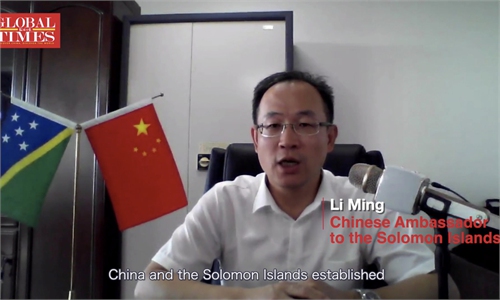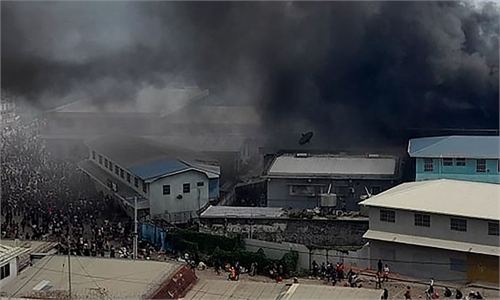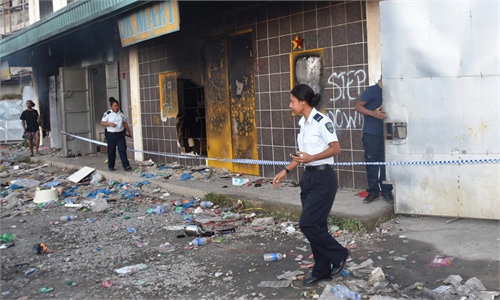GT investigates: Funding opposition, cultivating influence through cult - US, Taiwan island lurk in shadows of Solomon Islands riots
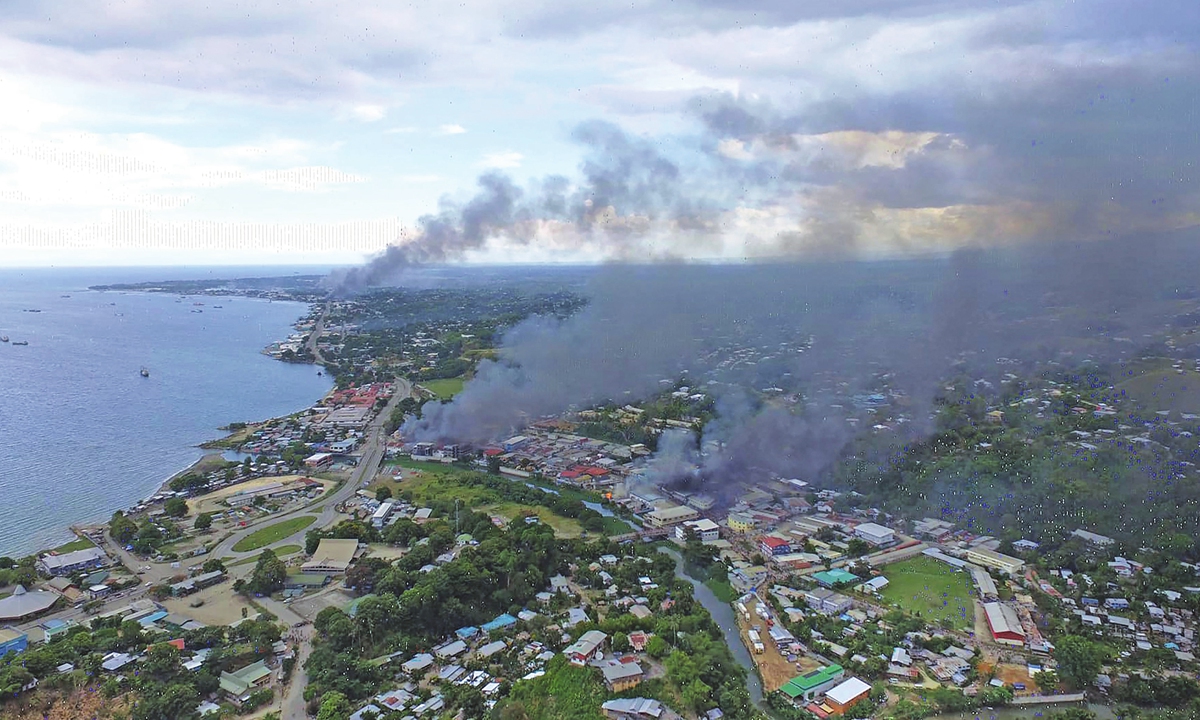
Smoke from burning buildings rise from Honiara on November 25, 2021. Photo: VCG
Riots in the southern Pacific nation the Solomon Islands are yet to be brought under control, with Chinatown in the country's capital, Honiara, being burned and looted, seeing Chinese nationals suffer incalculable losses. But what the riots truly reflect are the scope of influence the US and the island of Taiwan have over the region considering the island nation's history as a geopolitical pawn.
A survey of the Solomon Islands-based Chinese nationals' association obtained by the Global Times showed the extent of the impact suffered by Chinese merchants in Honiara as a result of the riots that have lasted for several days. Many now suffer from "homelessness and loss of income."
Some Chinese nationals in the island nation reached by the Global Times said that the riots in the past week were far more severe that those of 2006. They highly suspect Democratic Progressive Party (DPP) authorities' influence is behind the riots.
On Friday, the Prime Minister of the Solomon Islands, Manasseh Sogavare, told the press that the crisis "is influenced and encouraged by other powers." He further indicated that these forces influencing Malaita [the main island of the nation] are those that "don't want ties with the People's Republic of China," according to the Sydney Morning Herald.
Experts pointed out that the essence of what has been ensuing in the southern Pacific nation is "geopolitical competition among major powers." Since China and the Solomon Islands established diplomatic relations in September 2019, the US immediately switched its proffer of financial aid to the island of Malaita, part of the archipelago of the Solomon Islands and the major opposition of the country's central government. Moreover, Australia has been closely cooperating with the US in this turmoil, experts said.
On Sunday, the Chinese Embassy in the Solomon Islands told the Global Times that the situation has eased to some degree, but safety precautions still need to be strengthened. In the past two days, the embassy has been holding meetings with the Chinese community in the island nation to collect their demands and resolve their difficulties as much as it possibly can.
Cultivating influence
Several media outlets have reported that the rioters are from the island of Malaita, the Solomon Island's most populous province. Malaita, under the leadership of Daniel Suidani, has long been against the central government located on Guadalcanal, and Malaita's collusion with the island of Taiwan is far from a secret.
A photo circulating online showed that a merchant from Taiwan island in Honiara's Chinatown avoided being looted by hanging a "Taiwan flag."
However, this picture also triggered speculation on the role played by the DPP authorities in the riots.
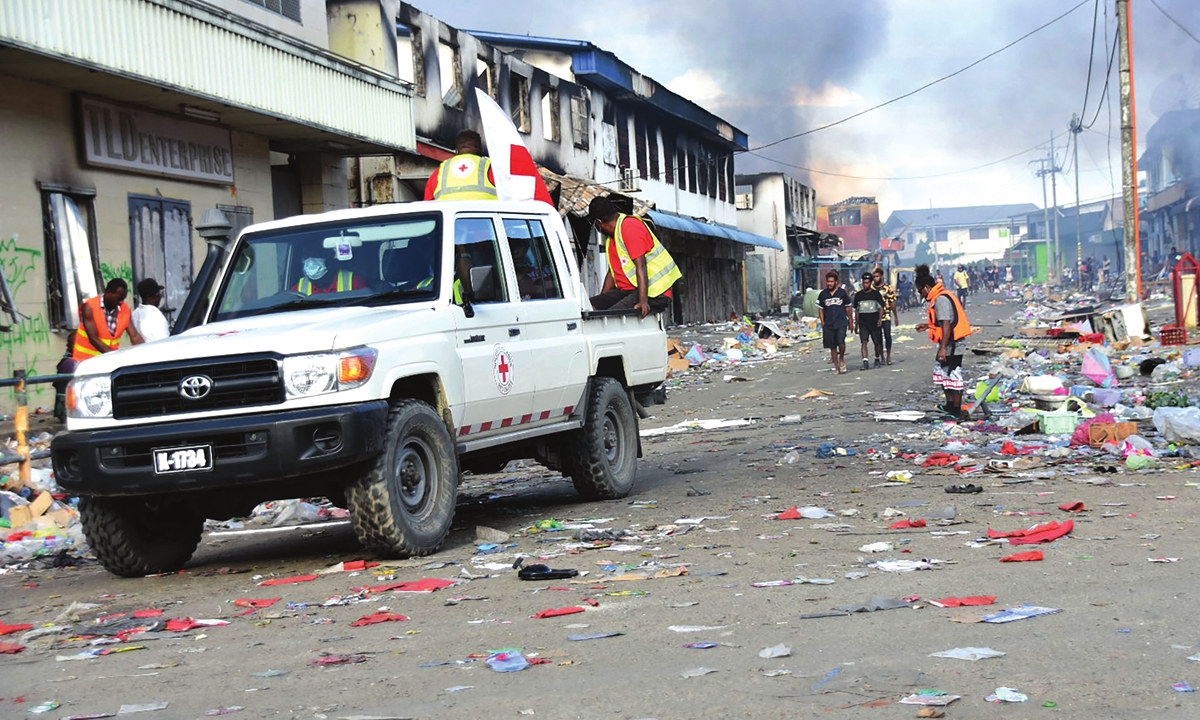
A Red Cross vehicle passes through the Chinatown district of Honiara, the Solomon Islands, on November 26, 2021.Photo: VCG
In May, Suidani, the premier of Malaita, went to Taiwan to undergo treatment for a brain tumor. His trip was condemned by the Solomon Islands' government as "unauthorized."A Chinese merchant in the island nation, who calls himself Alex, expressed his concern. "Riots broke out after Suidani's return from treatment. It is hard not to make people suspicious."
"Suidani's treatment in the island of Taiwan is antecedent to these riots,"Yang Honglian, a senior expert in Southern Pacific nations, told the Global Times. Yang noted that Suidani has long been accepting benefits from DPP authorities. Therefore in 2019 when China and the Solomon Islands established diplomatic ties, Suidani's interests were impacted, following a large protest in Malaita.
"He personally is also dissatisfied with Sogavare," Yang said, adding "As the gap between the two politicians gets bigger and bigger, Suidani needs to jump up and take action. So this time he is taking the opportunity to make a big fuss in order to meet his own political aspirations."
Yang noted that, though DPP authorities did not come out publicly in support, its long-term spreading of its influence in the South Pacific region was a factor behind the riots. For instance, the Global Times learned from a local observer that the Taiwan cult organization "Yiguandao" had played a role in Suidani's visit to the island of Taiwan. Moreover, "Yiguandao" has been ardently cultivating its power over the southern Pacific region in the name of "religious charity" and has increased its activities there in recent years.
Experts noted that Taiwan's aid to the South Pacific island countries is mainly in agriculture, followed by education. They distribute fruit and vegetables produced by small farms to locals and use these "small favors and small benefits" to gain goodwill.
The DPP authorities' long-term cultivation of influence in the region is considerable. Alex said that the DPP authorities' modus operandi was to showering island officials with bribes, which were distributed to electoral districts and then used in elections. But yeas on, Taiwan was unable to bring any tangible progress to the island nation's development.
Chinese mainland has employed a different method. It is more the adage "give a man a fish, and he will be hungry again tomorrow; teach him to catch a fish, and he will be richer all his life." It focuses on the long-term development of the local areas and helps the locals in the acquisition of life-changing skills.
On May 5, the groundbreaking ceremony of the 2023 Pacific Games Stadium Project was held. It is the first major infrastructure project in the Solomon Islands supported by the Chinese government. It is also the largest state of the art multi-purpose sports facility in the pacific island region.
Geopolitical battleground
Statistics provided by the Lowy Institute showed that from 2018, the US' aid to the Solomon Islands saw a rocket increase. ABC said in a 2020 report that the US pledged $25 million in aid for Malaita directly sparking concerns of misappropriation of aid funding as a weapon in a "geopolitical tussle."
The Diplomat also quoted observers as saying that "the US supports an anti-China movement in the Solomon Islands, as part of a wider resistance to growing Chinese influence in the Pacific region."
Meanwhile, Australia remains a huge influence in South Pacific region. "Australians hold huge amounts of real estate in the Solomon Islands,"a Chinese resident pseudonymed Jessica told the Global Times.
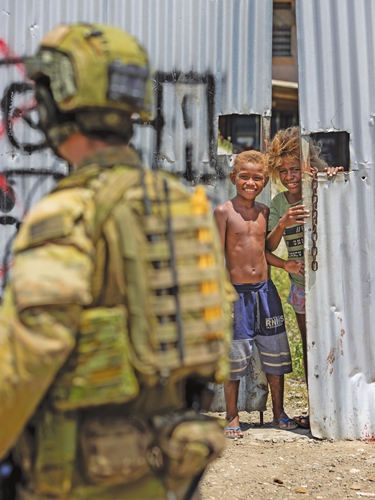
An Australian soldier is watched by young boys during a community engagement patrol through Honiara, Solomon Islands on November 27, 2021.Photo: VCG
Australian Prime Minister Scott Morrison said it was not Australia's role to interfere "in their democracy" as he sent troops to help maintain peace in Honiara. However, observers noted that the overall attitude of Australia and the US was to in fact "condone and even encourage the riots." "Isn't not holding a position on crime a support for evil?"Jessica said that some locals displayed a precautious attitude toward the Chinese. "The negative way of thinking that influenced by the Western world in the past cannot be eliminated immediately here."
"The South Pacific region is a battlefield for great international powers," Yang, the expert said.
The Biden administration announced in September that it plans to invest $1 billion a year in 14 island nations in the South Pacific region. This plan is also known as the South Pacific version of the "Marshall Plan."
"But the plan does not specify how much money each country will be allocated. It depends on how each island country behaves and whether the US can achieve their political goals from them," Yang said.
Impacted by riots
Jessica, who came to the Solomon Islands from China in 2018, is now hiding in a church and is sheltered by nuns. She recalled that the riot started on November 24 in the city center at Capitol Hill before the rioters from Malaita attacked Chinatown.
The rioters burned local schools, banks, and even police stations, but Chinatown bore the brunt of the most severe damage. Some Chinese merchant have reported an estimated loss of more than $6 million, and some have since been left homeless and have lost their sources of income, the Global Times learned.
"Almost everything in the Solomon Islands depends on imports," Jessica said. Chinese residents here mainly engaged in wholesale, retail, and in the catering industry in the Solomon Islands, and the local suppliers are basically all Chinese.
"The economy is suffering as a result of the chain of events. Whilst many people now are out of work due to the burning of businesses, affording basic goods will be difficult. This will lead to more problems because people will be compelled to find ways to survive. Some might use violence or crime," wrote a local article, which also touched on growing concerns over the hiking of prices of commodities.
On Friday and Sunday, Chinese Ambassador to the Solomon Islands Li Ming visited the Chinatown in Honiara to check the losses of the Chinese merchants. He urged local government and police to maintain the safety and legal interests of the Chinese community.

